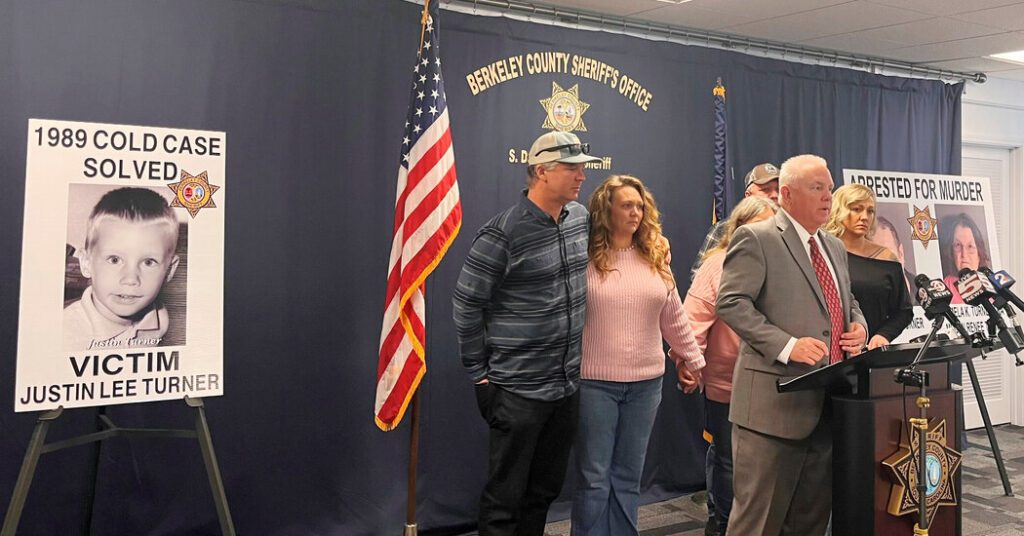A South Carolina judge on Friday dismissed murder charges against a father and stepmother accused of killing the father's 5-year-old son in 1989, citing long delays in filing criminal charges.
Ninth Judicial District Judge Roger M. Young Sr. wrote that the 35-year delay “caused substantial prejudice to both defendants and violated their right to a fair trial.”
More than 20 witnesses who could have testified in 1989 were no longer able to do so because of death or ill health, the judge wrote. As a result, lawyers for the father, Victor Lee Turner, 70, and his wife, Megan Rene Turner, 63, would not have been able to question witnesses, the judge said.
After the boy, Justin Lee Turner, was reported missing on the afternoon of March 3, 1989, the Turners initially told authorities that the boy had boarded the school bus and never returned.
Two days later, as filmed by local news station WCBD-TV in Charleston, South Carolina, Turner appeared to discover the boy's body in a RV on his family's property. “My son is out there,” Turner said quietly.
According to Judge Young's records, investigators believed Turner had strangled Justin with a dog leash found in the kitchen of her home in 1989. Turner was charged with murder in February 1990, but prosecutors dropped the charges later that year.
In 1992, prosecutors again presented their evidence to a grand jury, but the jury declined to indict them, citing “insufficient evidence” to convict them, Judge Young wrote.
The case sat abandoned for almost 30 years before being reopened in 2021.
According to an affidavit used to support the charges filed this year, investigators from the Berkeley County Sheriff's Office Cold Case Unit reevaluated autopsy results and physical evidence collected at the crime scene and found inconsistencies in the Turner family's account of Justin's disappearance.
According to the affidavit, Turner reported that Justin got on the school bus on a Friday morning in March 1989 and never returned. However, witnesses testified that they never saw the boy get on the bus and that he wasn't at school that day, the affidavit said.
On the second day of the search, Turner showed officers he was “clearly aware” of the boy's fate by asking officers what would happen if the family hurt or killed the boy, according to the affidavit.
According to the affidavit, Turner “pretended” to find the boy's body “within seconds” of entering the camper and not checking for signs of life.
When the Turners were arrested and charged in January, Berkeley County Sheriff S. Duane Lewis said Justin had never been on the bus because the Turners killed him and left his body in the camper.
Forensic techniques were used to match fibers found in the home with the boy's clothing and the wound on his neck, according to the affidavit, and no debris or other objects were found on the boy's body, clothing or shoes, suggesting he had been carried from the home to the camper.
But Judge Young wrote in his ruling Friday that “no new evidence was presented” at a hearing held in March involving detectives from the sheriff's office's cold case unit. While the sheriff's office believed Turner strangled Justin with the dog's leash and collar, the state “presented no new evidence on which it reached this conclusion,” Young wrote.
The judge ordered the proceedings against the Turners “permanently closed”, a decision that was welcomed by one of the couple's lawyers, Sean Kent.
“They should never have been arrested,” Kent said in an interview Monday. “There was no new evidence, and everyone they were relying on is long dead. The case just wasn't strong.”
Scarlett A. Wilson, chief prosecutor for the 9th Judicial District, said in a statement that there was no basis to challenge Young's rulings, including his finding that there was no new evidence in the investigation.
“It is rare that a prosecutor can say they could have done more to conduct a more thorough investigation, but in this case we know that Sheriff Lewis and his investigative team did all they could to find the truth and justice,” Wilson said.
During the March hearing, Turner presented a theory that Richard M. Evonitz, a suspected serial killer who died in 2002, had been in the area in 1989 and had an “opportunity” to kill Justin, Judge Young wrote.
Judge Young wrote that she presented evidence that Evonitz, who served in the Navy, was assigned to a ship that may have entered Charleston on or about March 2, 1989.
South Carolina investigators are seeking time to investigate the relationship, Wilson wrote. His office did not immediately comment.

